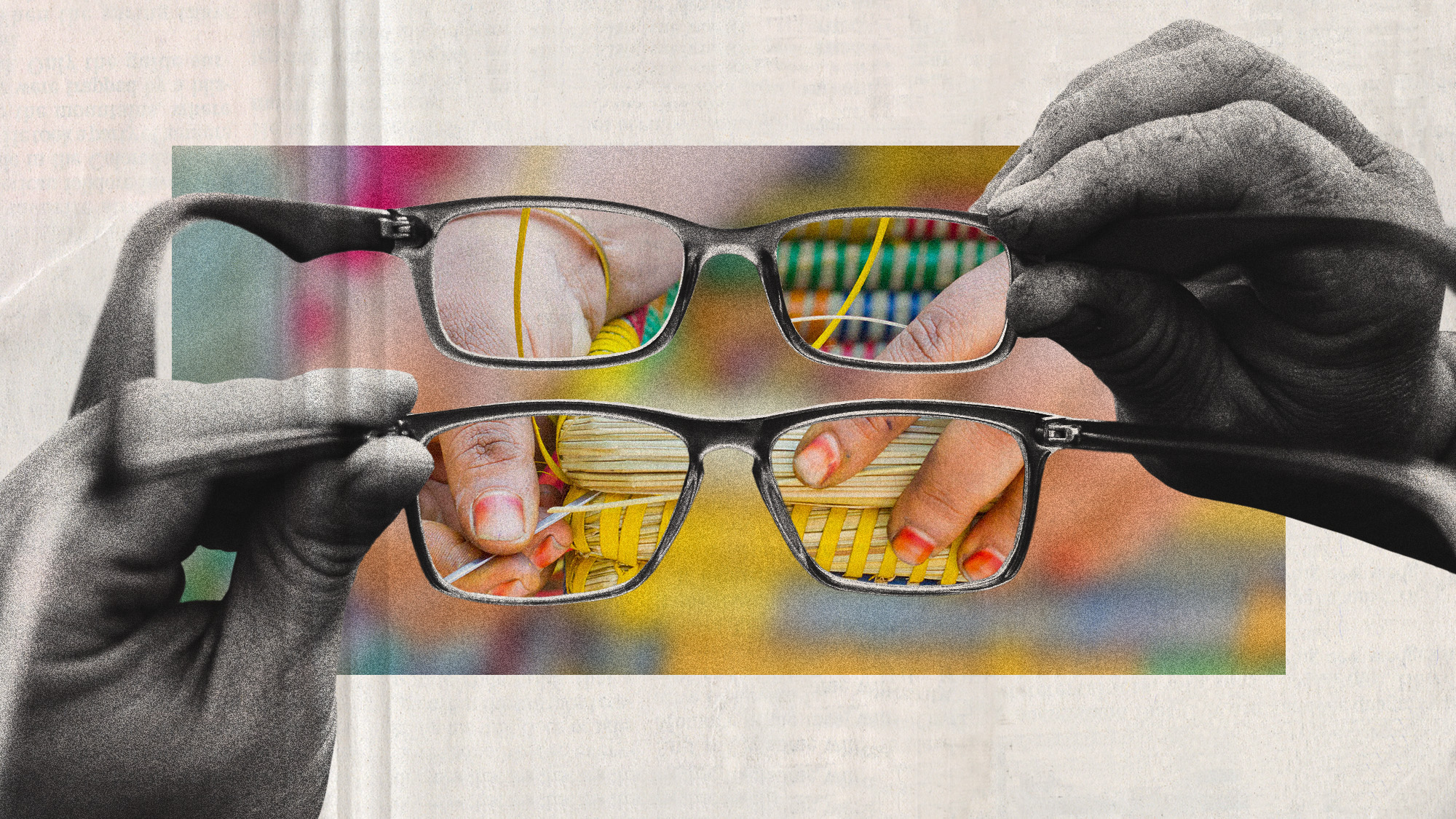Reading glasses could be an economic boost to people in low-income countries
A recent study found that providing glasses can significantly raise a person's earning power


A free daily email with the biggest news stories of the day – and the best features from TheWeek.com
You are now subscribed
Your newsletter sign-up was successful
It has been estimated that more than 4 billion people across the world wear some type of glasses, with reading glasses chief among those. However, while it is no secret that glasses can help people see and read, a new study has found that reading glasses might have an economic impact too, especially in more impoverished countries.
The study was published on April 3 by Queen's University Belfast in conjunction with the nonprofit groups VisionSpring and BRAC. The study examined people in a series of villages in Bangladesh, particularly those villagers suffering from presbyopia, or the "gradual loss of your eyes' ability to focus on nearby objects." The study concluded that providing these people with glasses "increases income in near vision-intensive occupations and may facilitate return to work for those currently unemployed."
While people in highly developed countries typically have access to reading glasses, people in third-world nations may have a harder time acquiring a pair, and this study shows that this could be a key factor keeping people in poverty. But how does the simple act of providing someone with reading glasses help boost third-world economies?
The Week
Escape your echo chamber. Get the facts behind the news, plus analysis from multiple perspectives.

Sign up for The Week's Free Newsletters
From our morning news briefing to a weekly Good News Newsletter, get the best of The Week delivered directly to your inbox.
From our morning news briefing to a weekly Good News Newsletter, get the best of The Week delivered directly to your inbox.
What were the study's findings?
The study set up an experiment in 56 Bangladeshi villages with more than 800 people, giving half of these people glasses while not giving glasses to the other half. The principal takeaway was that "income grew by 33% for those with glasses — from a median monthly income of $35 to $47," NPR said. Beyond this, previously unemployed people who were given glasses were able to enter the workforce, while those without glasses were not.
Demographics did not seem to make a difference either, as both groups had similar characteristics, the study said. The "mean age was 47 years, 50% were male, 35% literate," said the study. In addition, about half of the people in both groups had "most near vision-intensive" jobs. Given this, it appears that the main difference between the groups was, indeed, having glasses versus not having glasses.
This study is the "first time we can really say that something that will improve [someone's] quality of life from a visual standpoint will also help with poverty alleviation, which is an enormous finding," Dr. David Friedman, a professor of ophthalmology at Harvard Medical School, said to NPR.
Several examples were provided regarding cases where the simple act of providing glasses helped a person's income jump significantly. Farmer Jasmin Atker lives in Manikganj, Bangladesh, and after she was provided with glasses, her "improved vision enabled her to set up a vegetable patch," said NPR. This has helped Atker's monthly income rise from 9,000 to 10,000 Bangladeshi taka to 15,000 to 17,000 taka, or nearly $150.
A free daily email with the biggest news stories of the day – and the best features from TheWeek.com
"Before, when I tried to cut vegetables ... I couldn't see properly," Atker said to NPR. But since receiving glasses, the "time that I take for each task has reduced significantly."
Income boosts from glasses were not only seen in Bangladesh. Sarah Nakalyowa, a basket weaver from southern Uganda, would "use a needle and could not focus well while doing my work," she said to the Guardian. As her eyesight gradually worsened, it "took four days to do what used to take me a day. My income dropped to 100,000 to 150,000 Ugandan shillings a month," Nakalyowa said. But when she was provided with glasses, it made a "huge difference" immediately, Nakalyowa said, and the Guardian reported that her income is nearly back to its previous level.
How can people in low-income countries get glasses?
It is not easy — for "nearly a billion people in the developing world, reading glasses are a luxury that many cannot afford," The New York Times said. A "lack of resources was just one impediment to the increased distribution of reading glasses," Misha Mahjabeen, the Bangladesh country director for VisionSpring, said to the Times.
In Bangladesh and other similar nations, workers "must contend with the social stigma associated with wearing glasses, especially for women," Mahjabeen said to the Times. There is a silver lining, though, as the glasses in question are typically "nonprescription — they are essentially magnifying glasses, though they do come in different strengths," Phys.org said. This means they are significantly cheaper than prescription lenses, and "using village health workers, we can make the cost of delivery very inexpensive as well," Dr. Nathan Congdon, a coauthor of the study and Queen's University Belfast chair, said to NPR.
Justin Klawans has worked as a staff writer at The Week since 2022. He began his career covering local news before joining Newsweek as a breaking news reporter, where he wrote about politics, national and global affairs, business, crime, sports, film, television and other news. Justin has also freelanced for outlets including Collider and United Press International.
-
 Quentin Deranque: a student’s death energizes the French far right
Quentin Deranque: a student’s death energizes the French far rightIN THE SPOTLIGHT Reactions to the violent killing of an ultra-conservative activist offer a glimpse at the culture wars roiling France ahead of next year’s elections.
-
 Secured vs. unsecured loans: how do they differ and which is better?
Secured vs. unsecured loans: how do they differ and which is better?the explainer They are distinguished by the level of risk and the inclusion of collateral
-
 ‘States that set ambitious climate targets are already feeling the tension’
‘States that set ambitious climate targets are already feeling the tension’Instant Opinion Opinion, comment and editorials of the day
-
 Is the US in a hiring recession?
Is the US in a hiring recession?Today's Big Question The economy is growing. Job openings are not.
-
 Trump wants a weaker dollar, but economists aren’t so sure
Trump wants a weaker dollar, but economists aren’t so sureTalking Points A weaker dollar can make imports more expensive but also boost gold
-
 Tariffs have American whiskey distillers on the rocks
Tariffs have American whiskey distillers on the rocksIn the Spotlight Jim Beam is the latest brand to feel the pain
-
 The longevity economy booms as people live longer
The longevity economy booms as people live longerThe Explainer The sector is projected to reach $27 trillion by 2030
-
 How will China’s $1 trillion trade surplus change the world economy?
How will China’s $1 trillion trade surplus change the world economy?Today’s Big Question Europe may impose its own tariffs
-
 Texas is trying to become America’s next financial hub
Texas is trying to become America’s next financial hubIn the Spotlight The Lone Star State could soon have three major stock exchanges
-
 Employees are branching out rather than moving up with career minimalism
Employees are branching out rather than moving up with career minimalismThe explainer From career ladder to lily pad
-
 Who will be the next Fed chair?
Who will be the next Fed chair?Today's Big Question Kevin Hassett appears to be Trump’s pick
